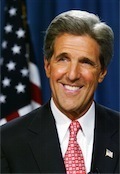Matthew Yglesias's Blog, page 2475
December 9, 2010
Primaries
I don't have a ton to say about the idle speculation over trying to mount some kind of left-wing primary challenge to Barack Obama in 2012. I will say that one thing we've seen from the conservative movement over the years is that even though primaries sometimes backfire (Christine O'Donnell, anyone?) they can also be a very effective tool of ideological discipline.
But . . . you've got to walk before you run, and you've got to crawl before you walk.
How about some Senate primaries where a more progressive candidate (a) wins the primary and then (b) wins the general election? Until there's some kind of track-record of that happening, everything else seems to me to be just idle talk.


Korea and Credible Commitment

South Korea attempts some deterrence:
South Korea will swiftly and strongly respond with force until North Korea surrenders if the communist state launches another assault, the South's new defence minister said.
Kim Kwan-Jin issued the warning on Saturday, during his inauguration speech after President Lee Myung-Bak officially appointed the retired four-star general as the new defence chief following a parliamentary confirmation hearing Friday. Kim Kwan-Jin replaced Kim Tae-Young, who came under fire over the military's allegedly feeble response to North Korea's deadly shelling of South Korea's Yeonpyeong Island near the tense Yellow Sea border on November 23.
"If North Korea launches another military attack on our territory and people, we must swiftly and strongly respond with force and punish them thoroughly until they surrender," the new defence minister said. "We do not want war, but we must never be afraid of it," he said, adding South Korea faces "the worst crisis since the Korean War," which ended in an armistice in 1953.
The problem here obviously is credibility. Read Robert Farley, but dwell particularly on the fact that not only would a successful ROK/DPRK war be costly for the ROK in terms of losses, but the curious fact that victory itself would be a disaster for South Korean living standards. Ask a (West) German someday about the cost of reunification, and consider that the task facing Korea would be an order of magnitude more difficult.


Did "Class Warfare" Doom John Kerry?

A selection from Noam Scheiber's reporting on the evolution of the tax debate:
Within the administration, the split over whether to mount a tax-cut offensive broke down largely along wonk-operative lines. The wonks spent the last year mystified that the White House was ducking the fight when the substantive merits were so one-sided. The operatives brooded that the politics could abruptly turn against them, despite polling showing little public appetite for the upper-income cuts. "They view it through the class warfare stuff—Kerry in 2004, Gore in 2000," says one administration official. "They worry that they'll get painted as lefties, tax-raisers."
The thesis here seems to be that "class warfare stuff" hurt John Kerry and Al Gore badly in 2000 and 2004. But where's the evidence? True, Kerry and Gore both lost. But surely that doesn't mean every single tactical decision they made went wrong. What's more, not only did Al Gore win the popular vote in 2000 but when you consider the Ralph Nader factor it's clear that Gore did a good job of getting the median voter to vote for him. What's more, Kerry overperformed the fundamentals as measured by the Hibbs "bread and peace" model. On top of that, though Barack Obama's 2008 platform differed from Kerry and Gore in a number of ways opposition to the Bush tax cuts was not one of those ways. So everything about this analysis seems arbitrary and suspect.


Department of Contradictions
Ever notice how conventional wisdom on the American right is that the Affordable Care Act is one of the most monumentally significant, albeit terrible, pieces of legislation in American history. And yet the conventional wisdom on the American right is also that the conservative movement's strategy in 2009-2010 was correct and has been utterly vindicated by the 2010 midterms.
There's obviously a certain . . . tension here. And the only way to resolve it is repeal.


The Miami Turnaround
On November 15, I wrote:
What I actually think, meanwhile, is that Miami's +9.4 point differential is tied with New Orleans for best in the league. So if Miami doesn't step things up, we should expect them to assemble one of the best records in the league over the course of the next 72 games. What's more, the currently injured Mike Miller is an underrated player whose return will help the team a lot.
So my prediction is that Miami will be fine, and by the end of the season sports pundits will be offering us a lot of narratives about the improved chemistry among the big three.
And here's a screen grab from ESPN:
Right now their point differential is +8.7, which puts them third in the league behind Boston and San Antonio. Point differential based on a small sample size is an imperfect predictor of future performance, but it's a much better one than win-loss record.


Juncker Slams Merkel

While the US has been obsessing over tax cuts, there's increasing European discontent with German Chancellor Angela Merkel's lack of real ideas about how to put the Eurozone on sounder footing. These tough cross border hits from Luxembourg Prime Minister Jean-Claude Junker are a sign of the times:
Juncker told German weekly Die Zeit in an interview that Berlin had not even properly looked at his proposal, which was aimed at helping weaker eurozone members raise money, before deciding to oppose it.
"Germany's thinking was a bit simplistic on this," he said. "They are rejecting an idea before studying it. This is very strange. This way of creating taboo areas in Europe and not dealing with others' ideas is a very un-European way of dealing with European matters," he said.
Merkel responded by urging for "calm" ahead of next Friday's summit of EU leaders, where discussions will focus on creating a permanent crisis mechanism for the eurozone and what the chancellor called "narrow" changes to EU treaties.
The issue behind the issue is that Germany is currently enjoying the most rapid 12-month period of GDP growth since reunification so there's no great sense of urgency here. And the issue behind the issue behind the issue is simply that like in most European countries, the German public is not particularly engaged with "European" politics as such. Newspapers have 4-5 times as many people covering the German parliament as they do covering Brussels. In America people care about their parochial interests, but there's a very real feeling of a national community and people who pay attention to politics pay attention to Washington. In Europe, especially in the larger countries, not so much.


A World Without a China
Americans have some odd ideas about the strength of the Chinese economy:
In the poll, only one in five Americans said that the U.S. economy is the world's strongest — nearly half picked China instead. Looking forward, Americans are somewhat more optimistic about regaining primacy, but still only about one in three expect the U.S. economy to be the world's strongest in 20 years. Nearly three-fifths of those surveyed said that increasing competition from lower-paid workers around the world will keep living standards for average Americans from growing as fast as they did in the past. Ruben Owen, a retired Boeing engineer in Seattle who responded to the survey, spoke for many when he said, "We're still in a reasonably good place … but it's going to get harder because other places are growing stronger."
Note that China is not only poorer than the USA, it's poorer than Ecuador. It's about half as rich as Uruguay or Belarus. Trinidad has about triple the per capita GDP of China. I think it's probably true that average living standards in America are no longer the highest in the world, but we're being beat by the likes of Norway, Switzerland, and the Netherlands not by China. But who knows? Maybe "stronger" just means "growing really fast" in which case China is, in fact, growing really fast.
The larger point is that, , "the world isn't zero-sum, at least when it comes to the global economy."
Just think about the impact on the United States if, for no clear reason, everyone in China died tonight. Would that decline in low-wage competition boost American living standards? It's difficult to see how. Lots of stuff Americans buy is made by Chinese people. If the Chinese people die, we won't have that stuff. Maybe Americans could make it instead. But then whoever's making that stuff would need to stop producing whatever it is they're producing now and start making made-in-China stuff. Either way, it adds up to less stuff being produced. Less stuff = lower, not higher, living standards.
But aha! you say. Currently we have about 9.8 percent of the population unemployed. They're not producing anything. Absent China, maybe those people would be mobilized and we'd equalize the quantity of production. And there's something to that. It does seem to be a shame that 9.8 percent of the people in America who want a job producing something are currently producing nothing. And, indeed, it is a shame. But it's not the existence of China that's got them in their current state of non-production. It's poor macroeconomic policy in the United States. We have the ability right now to mobilize many unemployed people and have them do something. We just need to spend money to pay them to do something. Doesn't "the money have to come from somewhere?" Not really. Money is just made up by the government. If we need more money, the government can create more money. What "has to come from somewhere" is actual productive capacity. But the existence of China doesn't reduce our capacity to produce. On the contrary, it increases the world's productive capacity. But America's political leadership has failed to fully mobilize our productive capacity, leaving more and more people adrift and fantasizing about the notion that somehow doing away with "competition" from foreign producers is the best way to reduce idleness.
The voters are confused about this, but the political leaders are the ones who fundamentally deserve the blame for the sorry current state of affairs.


December 8, 2010
Endgame
Reportage sur moto:
— Der Freitag.
— Taz.
— Tax deal's macroeconomic boost isn't quite timed right to maximize Obama's re-election chances.
— Will Billy Tauzin tell tales about White House dealmaking with health care interest groups?
— Gabe Klein gets sacked (unexpected to nobody except perhaps Dave Alpert).
— If you want to see impressive intellectual powers brought to bear on defending the indefensible, Reihan Salam is usually your guy.
— The bubbles that didn't pop (though I don't see why this is relevant to the issue of whether or not asset markets are "efficient").
Kraftwerk, "Tour de France" and yes this song isn't in German.


Things That Are Either Significant Or Meaningless
When I went to Germany in October of 2009, I would tediously find a way to insert a question about whether or not Germany should rethink its export-oriented economic model into every discussion. The answer was universally "no." Here in December of 2010, the answer is sometimes "yes." It's impossible to assess the real significance of the shift because of course I'm talking to different people. But I think there's a real change. The outcome of the last election followed by the arrival of the CDU-FDP coalition followed by strong economic growth has, paradoxically, created the incentive for left-of-center Germans to start coming up with ideas about underlying weaknesses in the model.
Meanwhile, German consumption is in fact now rising.
What you of course don't hear is "Germany is richer than Greece, Spain, or Portugal so naturally transfer payments to working class Germans should be cut in order to finance transfer payments to the poorer working classes of Greece, Spain, and Portugal."


The News From Iceland
First the good news:
Iceland's real gross domestic product grew by 1.2 percent in the July-September period from the previous quarter, the first quarterly increase since the same period in 2008.
Then the less good:
That the economy was not yet out of the woods was made clear by data showing that in the third quarter, G.D.P. shrank by 2.1 percent, on an annualized basis, from the year-earlier period. For the first nine months of the year, the decline was 5.5 percent.
Arsaell Valfells, a professor at the University of Iceland, says "We've basically gone back to 2003 in terms of the level of standard of living." Years worth of growth wiped out, in other words.
The scary thing is that, as Paul Krugman observes, Iceland is doing better than comparably situated countries. Massive collapse in the value of your currency takes a gigantic bite out of living standards, but seems to be a superior way of allocating the losses entailed by a crash than any other. Iceland's hidden advantage here is that the country is tiny (Iceland is to Sweden as Sweden is to the USA) so it can have a crash devaluation without disturbing the global economy as a whole.


Matthew Yglesias's Blog
- Matthew Yglesias's profile
- 72 followers






